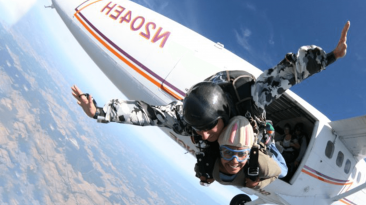If you find yourself going into a freefall inside a metal tube hurtling through the clouds at hundreds of kilometers per hour, and an oxygen mask drops down right in front of you – try not to panic. Airplane crashes are highly survivable.
All you need to know is a few tips on How to Survive a plane crash. Are you afraid of stepping on an escalator? Taking a flight on a commercial airplane is about as safe as that. The odds of being killed in a plane crash are 1 in 11 million.
Yet, we can all get that nervous feeling when taking our seats on a plane. But maybe, you just need to know which seat is the safest. And what to do if this yellow mask suddenly drops from the ceiling. Luckily for you, we put together six steps to help you get out of a plane crash alive.
Step 1: Dress appropriately
Your flip-flops may be comfy, but they’re not going to perform well in an emergency. And neither will your high-heeled shoes.
If your plane goes down, it’s not the fall that might kill you, but injuries in post-crash fires. So go for long pants and long-sleeved shirts. They’ll protect you from flames and sharp objects. And put on lace-up shoes, in case you need to run.
Step 2: Take the safest seat
It all depends on how exactly things go south, but generally, your best bet is to sit as far in the back as possible. You also don’t have to walk too far to use the bathroom. Sounds like a win-win to me.
But if you don’t have a choice, and are forced to sit at the front of the plane, don’t panic. The difference in the survival rate between sitting in the front or the tail of a plane isn’t too big. Besides, if the plane goes down tail-first, you might regret your decision not to overpay for extra legroom.
But regardless of where your seat is, you should know where the emergency exits are. Find the closest one to you as soon as you board the plane, and stay calm, knowing that you know where to run even if the cabin is filled with smoke.
Step 3: Don’t fall asleep immediately
The first three minutes after takeoff, and the last eight minutes before landing, are the most accident-prone times of the entire flight. So keep your shoes on, your seatbelt fastened, and your tray table up. Put your carry-on items under the seat in front of you. That will help to prevent your legs from going under the seat and getting broken.
And I wouldn’t need to tell you this if you just listened to the flight attendant during the safety talk.
Step 4: Stay calm
The first 90 seconds of a plane crash will decide your fate. Many people get so nervous they forget to unbuckle their seatbelt. Listen carefully to the instructions. But don’t just sit through the disaster if the flight attendants don’t say anything.
The cabin might experience sudden pressure loss and a lack of oxygen. You’ll only have about 10 seconds before you go unconscious. So if you see the oxygen masks drop down, put one on yourself right away. Only then should you try to help someone else.
Step 5: Leave your baggage behind
Evacuate from a falling plane as quickly as possible. Forget about your carry-on. You don’t want to end up stuck with it on a burning plane. If you’re carrying something that’s too important to lose, stick it in your pocket. But keep your arms free.
Step 6: Get away from the plane
If your plane hits the ground, there’s a high chance it’ll explode. You need to run. Get at least 150 meters (500 feet) away from the crash site, and run into the wind. Then wait for rescuers to find you.
In the history of aviation, this is the safest time to fly. Commercial aviation averages less than 500 fatalities per year worldwide. And of the planes that do get into accidents, over 95% of the passengers get out of them alive.
But if, in some very unlikely case, you need to jump off the burning plane without a parachute, don’t worry. We’ve got another video for that, to help you survive whatever awaits you.
Sources
- “Survivability of Accidents Involving Part 121 U.S. Air Carrier Operations, 1983 Through 2000” 2020. ntsb.gov.
- “How to Survive a Plane Crash”. Webmd.
- “How to Survive a Plane Crash”. Mark Lallanilla, LiveScience. 2013. Scientific American.
- “What Is The Safest Seat On A Plane?”. 2007. Popular Mechanics.
- “Surviving a Plane Crash: Where You Sit Could Be The Difference Between Life and Death”. News, ABC. 2020. ABC News.
- “The odds are 11 million to 1 that you’ll die in a plane crash”. 2013. theweek.com.


















